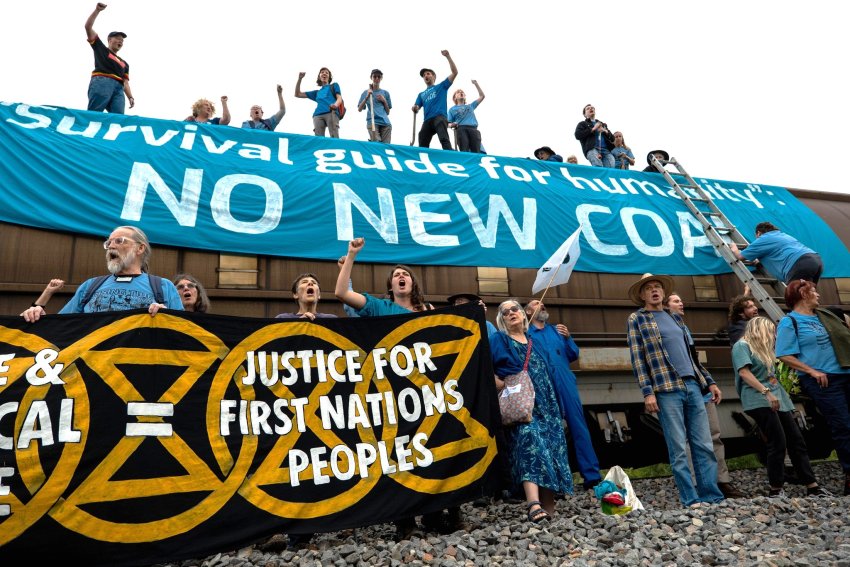
New South Wales Labor’s decision to delay the Eraring coal-fired power station closure should motivate everyone concerned about the climate to join the People’s Blockade of the world’s largest coal port in Muloobinba/Newcastle in November.
Muloobinba-based group Rising Tide is organising the blockade at Horseshoe Beach on the lands and waters of the Worimi and Awabakal people, over November 24–27.
Muloobinba is a little under 800 kilometres from Meanjin/Brisbane, about 1000 kilometres from Naarm/Melbourne, 1500 kilometres from Kaurna Yerta/Adelaide and 450 kilometres from Ngunnawal/Canberra. It’s a fair hike.
For 99.9% of those on the frontlines of the climate catastrophe, attending such a protest isn’t feasible.
Survivors of the massive floods in Libya or Pakistan won’t be able to, nor will the survivors of the Hawaii fires.
Those living in Bangladesh, Kiribati or the Torres Strait, who are on the frontlines of the rising seas, will appreciate what we do here to stop climate catastrophe.
Act of solidarity
Committing to attend the mass-based blockade is an act of solidarity with these communities.
Rising Tide, which was formed by activists protecting old growth forests in the early 2000s, knows that lobbying Labor will not change its mind on coal exports.
Only a strategic mass action approach has the potential to do that.
Research from The Australia Institute reveals that revenue from coal exports was up 186% in 2021–22 — an increase on the previous year of $73 billion. It is likely to remain at similar levels, as Labor is just as wedded to coal as the Coalition.
Newcastle is the world’s largest coal port: 1% of global carbon dioxide emissions come from the coal shipped through the port.
Symbolically and literally, Muloobinba is the global epicentre of the social and economic disaster capitalism is unleashing on us all. Arguably, it is one of the most strategic places on the planet for climate activists to target with mass civil disobedience.
At the G20 Summit in early September, Western leaders were again told the climate crisis is “spinning out of control” and is on track to become far worse.
Meanwhile, Labor governments are keeping coal and gas exports flowing. Environment minister Tanya Plibersek just approved her fourth coal project in Queensland, to run until 2073.
Cancel all new coal
Rising Tide’s protest has three demands: Immediately cancel all new coal mines and expansions; end coal mining and exports from the Port of Newcastle by 2030; and ensure nobody is left behind in the shift beyond coal.
This last demand “means government-led support for new jobs, industries and training and embracing the opportunities to make Newcastle a world-leading renewable energy port”.
Rising Tide organised a rally in June to support a campaign by the Hunter Jobs Alliance and partner unions, the Maritime Union of Australia, the Electrical Trades Union and the Australian Metal Workers Union, for a wind farm zone off the Muloobinba coast.
Many workers in the Hunter Valley mining towns, which feed the port, are understandably sceptical about the idea of a “job guarantee” that allows them to leave coal-related work without losing their hard-fought wages and conditions. This is largely because one has not been offered.
But if large numbers join the blockade to demand governments invest billions to ensure no coal worker is left behind, workers may feel less vulnerable and isolated. They might even consider how they can join the movement for sustainable jobs and safe climate.
Creating secure, well-paid jobs for coal and related workers to exit the industry is both necessary and feasible. Rising Tide is calling for a 75% tax on fossil fuel profits. But to achieve that will require mass pressure, such as the November blockade, to force that kind of visionary leadership.
Rising Tide plans to halt the port for two days. A mobilisation of thousands in November is envisaged as a step towards more ambitious blockades in the future.
Rising Tide has a non-violent direct action approach. Over time, it has adopted an explicit strategic focus on mass action as its People’s Blockade concept indicates. It has also refined its demand that no coal workers are left behind.
You can stand in solidarity with these workers by undertaking the simple, yet powerful, step of travelling to the port to prevent coal ships coming in and out.
The blockade is attempting to build a network across Australia that can mobilise tens of thousands of people, perhaps more, to close the port down for longer.
Rising Tide and supporters in the Hunter region fighting the multinational coal industry goliath punch above their weight.
But they cannot win this battle alone. It is important that as many people as possible take part in the November blockade.
[Zane Alcorn is helping organise a contingent from Naarm to the People’s Blockade. He is a member of Socialist Alliance. Register for the blockade here. This article was updated with new information on November 20.]